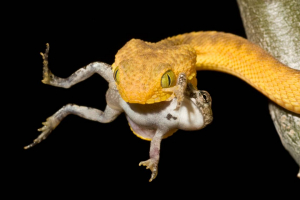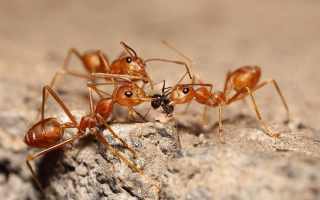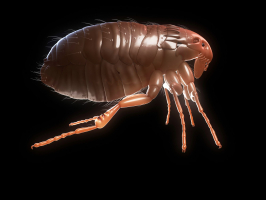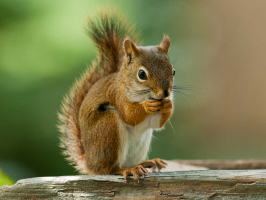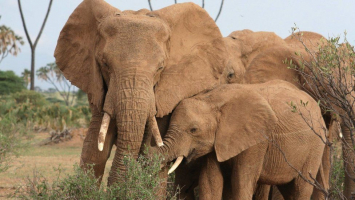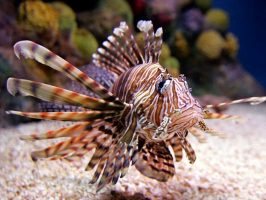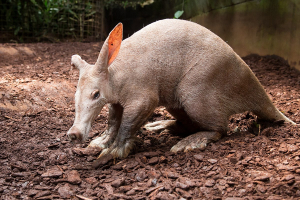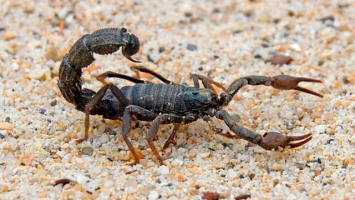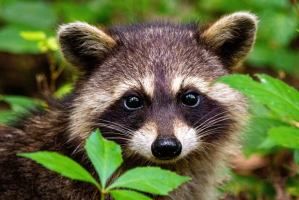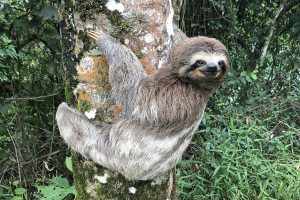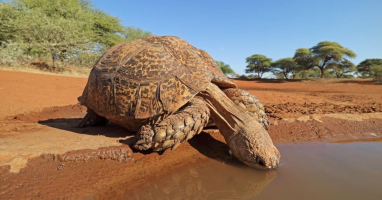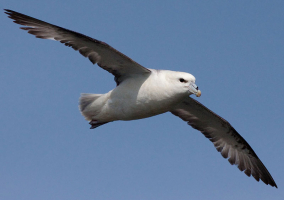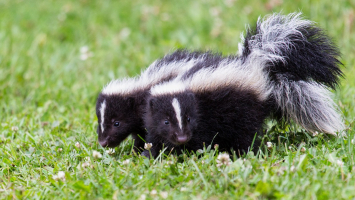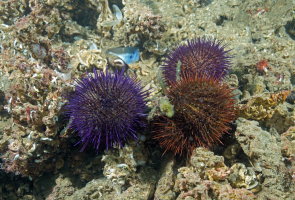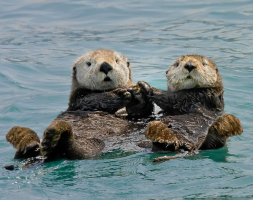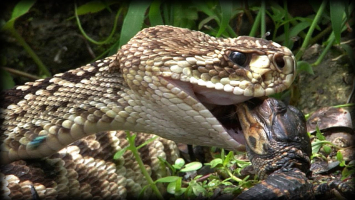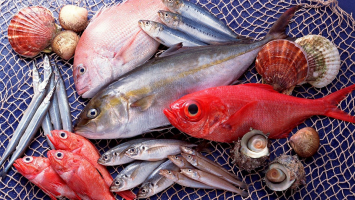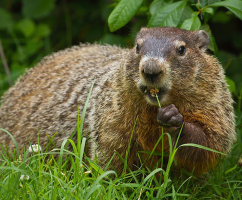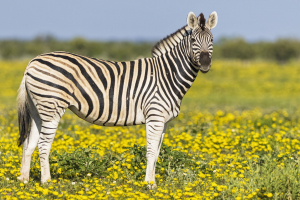Top 7 Predators of Moose that Eat Moose
The moose is a creature that is indigenous to North America. Despite their enormous size, moose are often not aggressive creatures, yet they will make an ... read more...effort to defend themselves from some predators. Here are predators of moose that eat moose.
-
Wolves are the moose population's primary natural predators. The US government has periodically deployed wolves to reduce the moose population because of their lengthy history of hunting and killing moose.
While a wolf cannot compete in size with a moose, it makes up for this with intellect and teamwork. It is quite difficult for moose to avoid being killed by this moose predator since wolves almost typically hunt in packs. Wolves are extremely patient and smart animals, in addition to being aware of the value of power in numbers. If they can't find one, they will kill a moose over a period of days. They prefer to hunt the weaker animals in a herd. They may occasionally kill a moose if they find it to be weak after attacking it in a group a day or two earlier.
A moose in its prime may be able to outrun a pack of wolves despite having relatively little natural protections against them. However, wolves frequently capture the mooses that they pursue. The diet of wolves must include moose in order for them to live. In general, wolves prefer to prey on ungulates and larger animals. American scientists have spent more than 50 years researching the interaction between wolves and moose on Lake Superior in North America. Only moose and wolves live in the remote Isle Royale National Park in Michigan. Both species' populations have been carefully observed over time and have fluctuated greatly. But by 2018, wolf numbers had drastically decreased, necessitating the introduction of more wolves into the community.
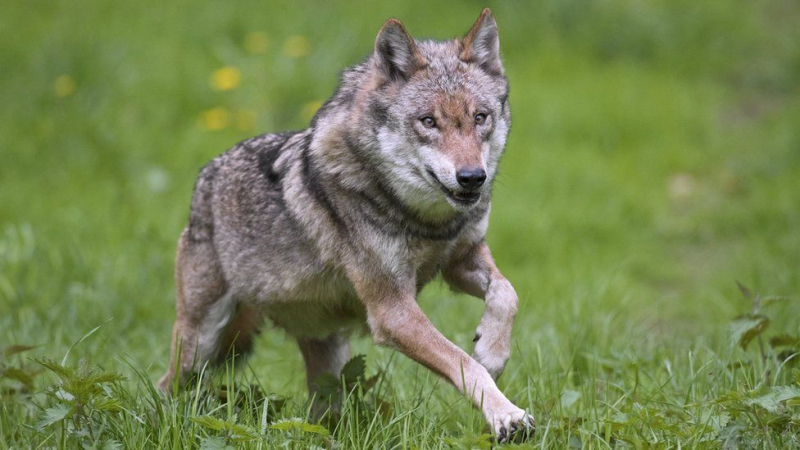
Photo: BBC - Wolves Video: National Geographic (https://www.youtube.com/@NatGeo) -
Given their size, moose have very few natural predators in the wild. One of the few predators of moose that eat moose is the Grizzly Bear and American Black Bear.
The American Black Bear is the first of them. These little bears occasionally assault and devour moose in the wooded areas where they cohabit, even though they do not actively seek them out. It's only a matter of chance and appetite for the omnivorous Black Bear, who can and frequently does coexist with adjacent moose and other animals. A hungry bear has to eat, and a big moose is an appealing prey.
However, Grizzlies are larger than moose and have appetites to match their size. As a result, if a moose is seen grazing nearby, grizzly bears can and frequently do attack them.
Even though the moose's defensive choices are limited, fully grown animals still retain their antlers and their size, which can protect them from attacks by younger, smaller bears. A hungry grizzly may keep an eye out for older animals that may be injured or just weaker because moose don't often live in groups. This is an excellent approach for them because an adult moose in fear can move at speeds of almost 35 miles per hour. However, calves are particularly vulnerable since up to 50% of them succumb to wolf or bear attacks before they become 6 months old. However, up to the age of 18 months, their moms would make an effort to safeguard them. The mother will chase her calves away at this stage when she goes into estrus, leaving them to fend for themselves. Although the good news for moose is that their survival rate is much greater once they reach adulthood at approximately 4 years of age, up to 95% in fact, until then the calves are still quite an appealing target for hungry bears and wolves.
Video: ViralHog (https://www.youtube.com/watch?v=Oxx3cL_vifA) 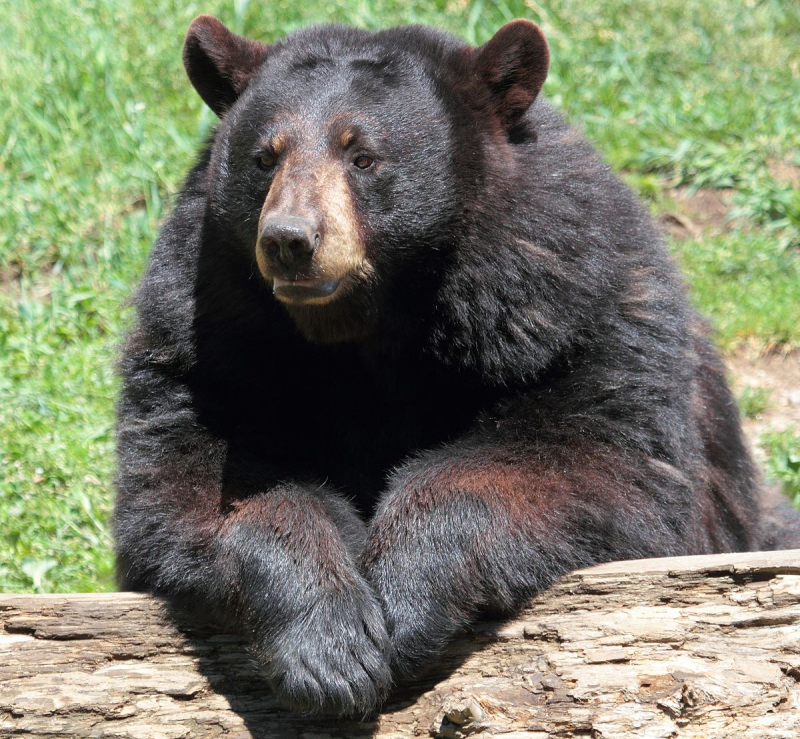
Photo: Wiktionary - American black bear -
Since it is not often known that tigers and moose reside in the same locations, they are not frequently recognized as natural moose predators. The overlap of these ungulates with tigers was minimal, despite the fact that they hunt on both Siberian roe deer and sika deer. There was little correlation between moose distribution and tiger distribution. An accurate predictor of the distribution of tigers was the distribution of the preferred habitat of important prey species. In the same geographical region as the Siberian tiger, two subspecies of moose also exist in Siberia. The Siberian moose (Yakut) and West Siberian moose are these (Ussuri).
The Siberian tiger, the biggest big cat species in the world, needs massive prey to stay properly nourished. Moose are the ideal species of animal for Siberian tigers to feast on. The Siberian tiger, like many other predators, frequently chooses to kill young, elderly, female, damaged, or sickly moose. A tiger can sustain significant injuries at the hands of a healthy adult bull moose because of the animal's strong legs or antlers.
An approaching tiger will pursue a moose as it forages amid the forest before killing it. The moose will be choked to death when they pounce on their throat with such power. Because tigers and moose are both excellent swimmers, this presents a challenge for moose. This implies that they also target the moose around the streams.
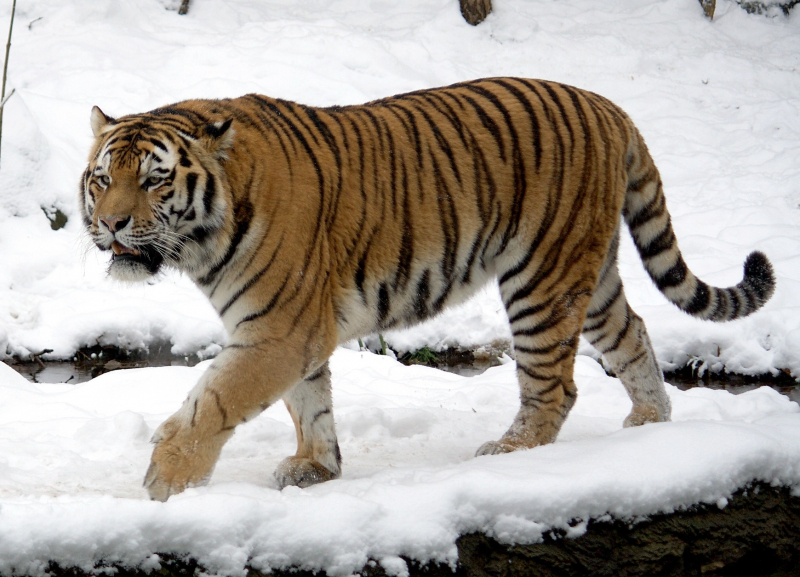
Photo: Wikipedia - Siberian tiger Siberian tiger - Video: BBC Earth (https://www.youtube.com/watch?v=U8hLgoZJimc) -
The huge cat known as the cougar (Puma concolor) is indigenous to the Americas. It is the most widely distributed big wild terrestrial animal in the Western Hemisphere, with a range that stretches from the Canadian Yukon to the southern Andes in South America. It is a flexible, generalist species that may be found in the majority of American habitat types. It goes by numerous names, such as puma, mountain lion, catamount, and panther, due to its extensive distribution.
The vast majority of the prey that cougars kill have hooves. Cougars will also hunt on moose if they are present in the same region. Moose will be killed by cougars of both sexes. The female will mostly target young moose between the ages of one and two years old. Even yet, if they have a mother who is watching out for them, this might be dangerous for them. More than any other hoofed mammal, cougar males like to go in search of moose to kill. In the winter, moose may make up more than 90% of a male cougar's diet in Canada's northern areas.
Only mature moose in terrible condition will attract cougar attention. This has been demonstrated by studies looking into the bone marrow of moose that were cougar prey in Alberta. Cougars will spot weak and hungry moose and will typically ambush them to kill them. Typically, the cougar would spring onto the moose's back and attack it in the neck with a vicious and crushing bite.
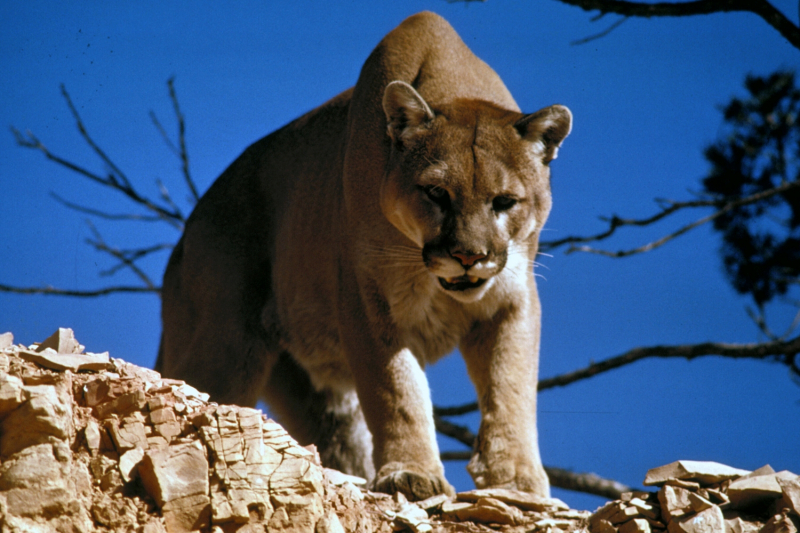
Photo: Wikipedia - Cougar 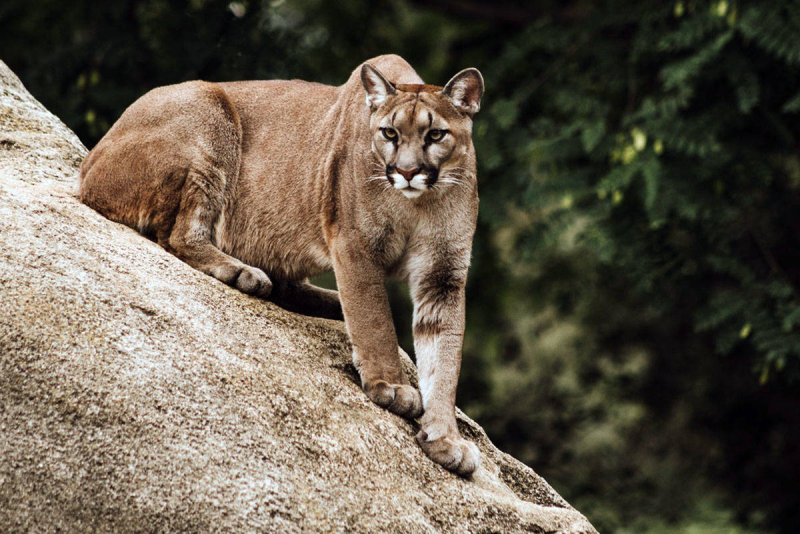
Photo: Smithsonian Magazine - Cougar -
The biggest land-dwelling member of the Mustelidae family is the wolverine, also known as the glutton, carcajou, or quickhatch. It is a strong carnivore that lives alone. The wolverine has a reputation for ferocity and power that are out of proportion to its size, and it has been shown to be capable of taking down prey that is several times its own size. Wolverines frequently go for live food that is relatively simple to catch, such as animals captured in traps, young mammals, and deer (including adult moose and elk) who are debilitated from the winter or paralyzed by heavy snowfall. Birds' eggs, birds (particularly geese), roots, seeds, bug larvae, and berries are occasionally added to their meals as supplements.
Wolverines is one of the predators of moose that eat moose. Given the size disparity between the two creatures, a wolverine killing a moose may be extremely shocking. Wolverines are moose predators, but they require the ideal circumstances to make a kill. An adult moose can be killed by a wolverine. However, they must be ill or hurt for long enough for the wolverines to overcome them. Wolverines can also aid in the killing of weak moose by starving them and exhausting them with heavy snow.
Wolverines are excellent at hunting prey in harsh winter conditions. Snow causes moose to move more slowly, which benefits the wolverine. Wolverines may severely injure moose during a protracted attack thanks to their sharp claws, sturdy jaws, and potent fangs. When moose are killed by other animals and left as carrion, wolverines frequently devour the flesh. Because of this, wolverines frequently hang around with wolves, waiting for them to kill a moose.
Video: Nat Geo WILD - Wolverines 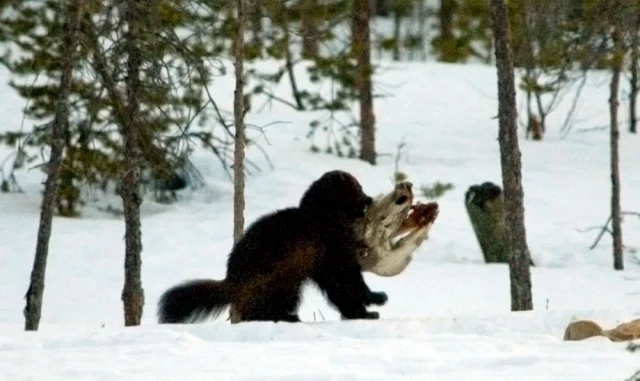
Photo: Reddit - Wolverine eating a moose head -
The orca, sometimes known as a killer whale, is the biggest member of the marine dolphin family and is a toothed whale. Although different populations of orcas sometimes specialize on certain kinds of prey, orcas have a varied diet. Some dolphin species just consume fish, while others hunt seals and other dolphin species. Baleen whale calves and even adults have been known to be attacked by them. Due to the lack of any other natural predators, orcas are apex predators. It has been said that their highly developed hunting strategies and vocal mannerisms, which are frequently unique to a given group and passed down through generations, are examples of animal culture.
As you wouldn't generally place moose and orcas in the same environment, this one might come as quite a surprise. Nevertheless, moose are skilled swimmers and will cross bays and islands in northern Canada and Alaska. Some nearby killer whales live in these deep waters and are seeking for prey. In comparison to their speed on land, moose move much more slowly in water. The moose will be killed as they swim because the orcas will take advantage of this.
Undoubtedly, orcas are big enough to fight a moose. Additionally, the moose are simple targets for hunters due to their weak aquatic defenses. Since orcas are apex predators and will consume a wide range of aquatic creatures, this comes as no surprise. Because they are carnivores, orcas exclusively consume the flesh of other animals. Orcas use a variety of methods for killing prey, including ramming, biting, and drowning. Orca bite marks may be seen on the flesh of moose carcasses that have washed up on the coast. Orcas are opportunistic hunters, so even if they don't usually hunt moose, they would probably do so if given the chance.
Video: BlueGum - Orca eat moose 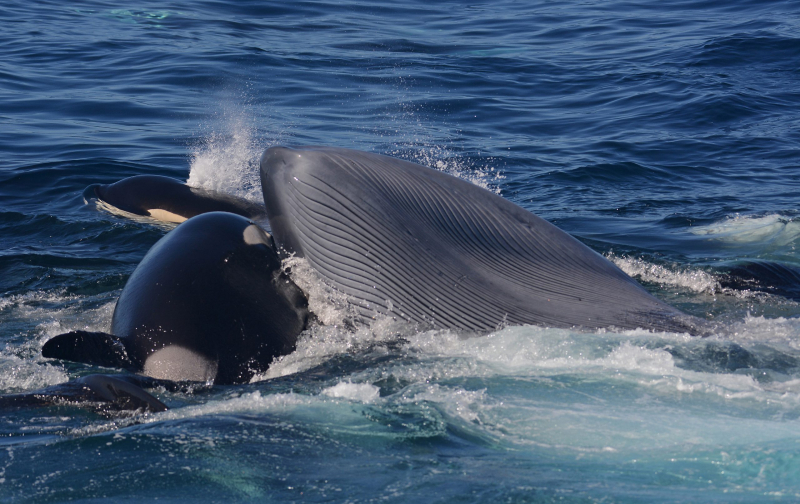
Photo: eKathimerini.com - Orcas -
Humans are the largest single mammal to kill moose in large numbers. Big-game hunters kill a lot of moose every year—hundreds of thousands of them. In most nations, moose population management is the primary justification for issuing hunting licenses. Moose can be considered a threat, especially if they reside close to a community of humans and have the potential to be fatal or seriously hurt. Numerous moose are also slaughtered for their flesh, for pleasure, for their fur, and for trophies. In the realm of large game hunting, they are incredibly attractive targets due to the magnitude of the kill.
Among some regions of North America and Canada, humans hunt moose on a regular basis, and in the hunting community, catching and killing one is considered an accomplishment. Although there is much debate over it, some claim that hunting moose helps keep them from overpopulating certain regions of North America. The most populous US state, Alaska, sees over 7000 moose slain annually. To reduce population levels, Sweden is believed to shoot about 100,000 moose annually. It goes without saying that a person needs a weapon to kill a moose. Rifles or bows and arrows are the weapons of choice that are most frequently utilized. Moose are typically taken down by hunters by shooting them in the heart or both lungs.
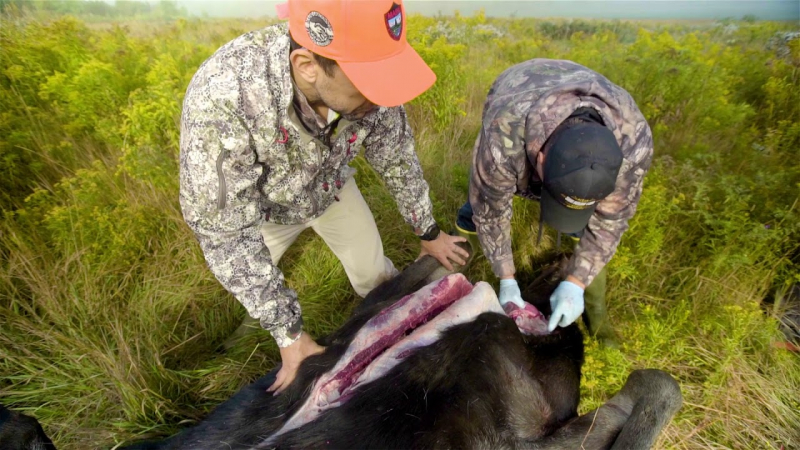
Photo: Maine.gov - Humans hunt moose Video: CRaptor - Man shoots moose with his GLOCK after being attacked









